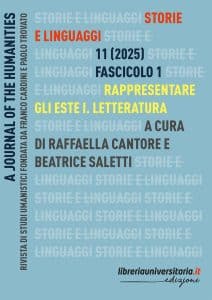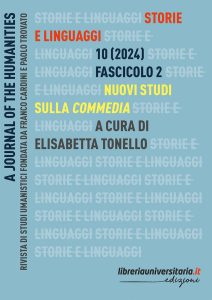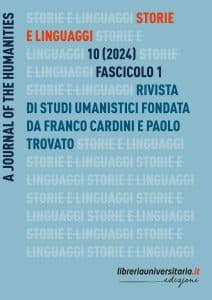
Storie e linguaggi
La rivista Storie e linguaggi, fondata da Franco Cardini (Istituto Italiano di Scienze Umane, Firenze) e Paolo Trovato (Università di Ferrara) nel 2015, è stata recentemente inserita dall’Anvur nell’elenco delle riviste di classe A per i seguenti settori concorsuali: 10/C1 (Teatro, musica, cinema), 10/D3 (Lingua e letteratura latina), 10/D4 (Filologia classica), 10/E1 (Filologie e letterature mediolatine e romanze), 10/F1 (Letteratura italiana), 10/F2 (Letteratura italiana contemporanea), 10/F3 (Linguistica e filologia italiana), 10/F4 (Critica letteraria e letterature comparate), 10/I1 (Lingue letterature e culture spagnola e ispano-americana) , 11/A1 (Storia medievale). Accoglie studi di storia senza aggettivi, di storia letteraria e artistica, di filologia e altro fino all’antropologia culturale. Il progetto nasce dall’incontro fra studiosi convinti che la ricerca scientifica sia un dovere civico e una necessità sociale, che le discipline umanistiche debbano aprirsi generosamente alle scienze umane e che anche i testi più antichi, lungi da qualunque tentazione “attualizzante”, vadano studiati nel presente in funzione del futuro.
This journal, which comes out as part of the series of the same name, born in 2012, includes a wide range of studies in the humanities, from fields such as history, literature, art history, philology, and cultural anthropology, in the hopes of stimulating an exchange of ideas, outlooks, and approaches useful not only for the academic world but for our society as a whole.
The project emerged from out of an encounter amongst scholars who are convinced that scientific research is a civic duty and a social necessity, and that therefore, humanistic disciplines should be generous and more open to the public sphere, and that even the most ancient of texts, far from any temptation to “bring them up to date,” should be studied in the present with an eye on their place in the future.
Editorial / Informazioni editoriali
Editors / Direttori
Paolo Trovato, Università di Ferrara
Beatrice Saletti, Università di Ferrara
Editorial board / Comitato scientifico
Angela Maria Andrisano, Università di Ferrara
Olivier Bivort, Università di Ca’ Foscari, Venezia
Paolo Cherchi, University of Chicago
Maria Adele Cipolla, Università di Verona
José Enrique Ruiz Domenec, Universidad Autónoma de Barcelona
Andrea Giardina, Scuola Normale Superiore di Pisa
Loretta Innocenti, Università di Ca’ Foscari, Venezia
Martin McLaughlin, University of Oxford
Brian Richardson, University of Leeds
Francisco Rico, Universidad Autónoma de Barcelona
Marco Tarchi, Università di Firenze
Raymund Wilhelm, Alpen-Adria-Universität Klagenfurt
Publishing copy-editors / Comitato di redazione
Loris De Nardi, Universidad Nacional Autónoma de México
Jacopo Gesiot, Università di Trieste
Elisabetta Tonello, Università eCampus, Novedrate
Legal representative · Direttore responsabile
Mario Lion Stoppato
Storie e linguaggi is a semestral Peer-Reviewed Journal
Storie e linguaggi è una rivista semestrale sottoposta a peer-review
Registrazione Tribunale di Padova n. 2393
ISSN 2464-8647 (print) 2421-7344 (online)
Proposte / Submission
Eventuali proposte di pubblicazione vanno inviate via e-mail a redazione@libreriauniversitaria.it.
Any proposals for publication must be sent by e-mail to redazione@libreriauniversitaria.it
Codice etico /Publication ethics and malpractice statement
Storie e Linguaggi, edited by Paolo Trovato and Beatrice Saletti, is a peer reviewed semestral journal committed to upholding the highest standards of publication ethics. In order to provide readers with articles of highest quality we state the following principles of Publication Ethics and Malpractice Statement.
Authors are obliged to participate in peer review process and ensure that they have written original articles. In addition they ensure that the manuscript has not been issued elsewhere. All authors have significantly contributed to the research. Authors are also responsible for language editing of the submitted article. Authors confirm that the submitted works represent their authors’ contributions and have not been copied or plagiarized in whole or in part from other works without clearly citing. Any work or words of other authors, contributors, or sources (including online sites) are appropriately credited and referenced. All authors disclose financial or other conflict of interest that might influence the results or interpretation of their manuscript (financial support for the project should be disclosed). All authors are obliged to provide retractions or corrections of mistakes and agree to the license agreement before submitting the article. The publication of articles in the journal is free.
The editors ensure a fair double-blind peer-review of the submitted papers for publication. The editors strive to prevent any potential conflict of interests between the author and editorial and review personnel. The editors also ensure that all the information related to submitted manuscripts is kept as confidential before publishing.
The editors coordinates the editorial board for reviewing the works to be published in Storie e Linguaggi. The reviewers, members of the scientific committee, include experts in the field of higher education, university lecturers and researchers. Each is assigned papers to review that are consistent with their specific expertise.
Reviewers should have no conflict of interest and check all papers in a double-blind peer review process. The reviewers also check for plagiarism and research fabrication (making up research data) and falsification (manipulation of existing research data, tables, or images). In accordance with the code of conduct, the reviewers report any cases of suspected plagiarism or duplicate publishing.
Reviewers evaluate manuscripts based on content without regard to ethnic origin, gender, sexual orientation, citizenship, religious belief or political philosophy of the authors. They ensure that all the information related to submitted manuscripts is kept as confidential and must report to the editors if they are aware of copyright infringement and plagiarism on the author’s side. They must evaluate the submitted works objectively as well as present clearly their opinions on the works in a clear way in the review form. Reviewers should point out relevant published work which is not yet cited. A reviewer who feels unqualified to review the research reported in a manuscript notify the editors and excuses himself from the review process.
If an author discovers a significant error or inaccuracy in their article after it has been published, the author must notify the editorial collective and cooperate fully if an amendment or retraction is judged to be in order. In the event that an allegation of research misconduct relating to a published article is brought to the editorial board, the journal will follow the guidelines of the Committee on Publication Ethics in responding to the allegation.




